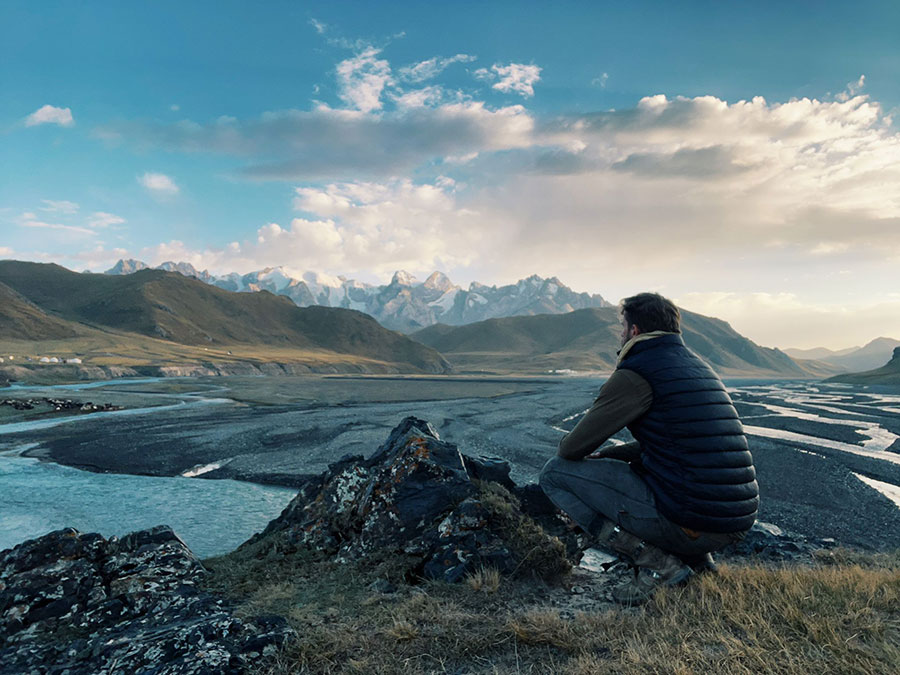After 14 years in the British Army and a diagnosis of PTSD and Major Depression, Max, also known as The Scrambling Nomad, made a life-changing decision: to ride his motorcycle across the world. What started as a desperate search for healing became an extraordinary journey through deserts, mountains, and the mind. In this raw and powerful interview, Max shares how the road saved him, what it means to find stillness in motion, and why veterans need to be seen, heard and remembered.
1) What inspired you to leave everything behind and ride around the world on two wheels?
In 2021, I was diagnosed with Major Depression and Complex PTSD. After 14 years of service, the military medically discharged me. I was in a dark place, throwing myself into therapy, trying to heal before my last day in uniform, before I officially became a civilian. The pressure I put on myself nearly broke me.
My therapist suggested I take some time for myself, do something I actually wanted to do. I remembered that when I rode my motorcycle, the noise in my head would soften. So I headed to Morocco for three weeks, alone on my bike. I almost didn’t come back. But on the return trip, crossing the Spanish Pyrenees, I had a kind of eureka moment: I’m going to ride around the world.
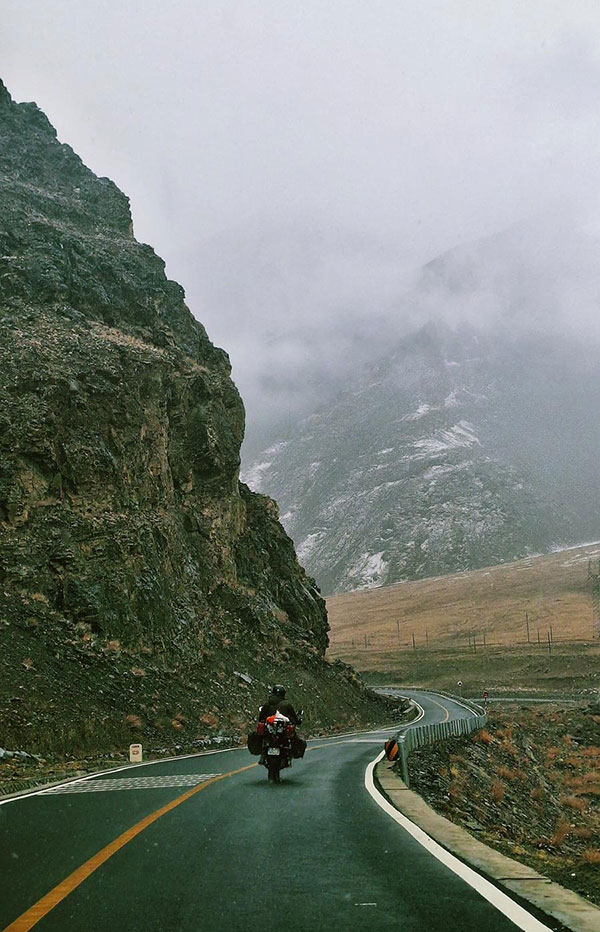
Or maybe it was just a massive midlife crisis. Hard to tell.
2) How has long-term solo travel helped with your mental health, and what role has motorcycling played in your healing?
This one’s tough. I keep coming back to that Charles Bukowski line:
“When nobody wakes you up in the morning, and nobody waits for you at night, and you can do whatever you want… what do you call it? Freedom or loneliness?”
That paradox hits me daily. Waking up in a strange land, with no one telling me what to do, sometimes it’s overwhelming. But then I sit on Tara, start her up, roll the throttle, and suddenly there’s a rush of freedom like nothing else. A new horizon. A sense of possibility.
Solo travel strips you back. There’s no escape from your thoughts. The helmet becomes a confessional booth. And that can be cathartic, or it can be brutal. But the road keeps you alert. Present. The body’s busy. The mind processes in the background.
What’s saved me more than anything is community, especially among bikers. In Afghanistan, I was adopted by a motorcycle club in Kabul. I lived with them for three weeks. They gave me brotherhood, safety, belonging. And yeah, riding across Taliban checkpoints at night with AK-47s strapped to our backs maybe isn’t the safest idea, but I’ve rarely felt more protected. Or more alive.
3) You’ve called Tara, your Triumph Scrambler, the Green Goddess. What makes her special, and why this bike for such an ambitious journey?
Tara’s a Triumph Scrambler 1200 XE. Not the obvious choice for this kind of trip. Most seasoned overlanders would tell you to pick something lighter, more manoeuvrable, and easier to pick up when it drops. And yeah-lifting 300 kg of dead weight in 40-degree desert heat is a serious energy sapper.
I almost sold her before the trip. Took pictures, started prepping the ad. But I took her out for one last ride and realised: I loved her too much. I couldn’t do it without her. We had to go together.
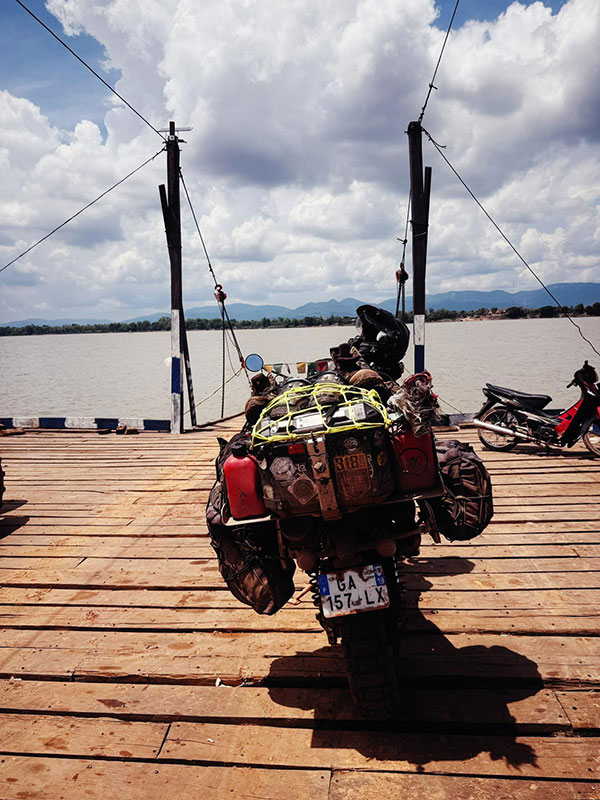
She’s a big bike. Heavy. A bit cranky at times. But she’s been loyal, through this journey and long before it. And I intend to stay loyal to her, all the way to the end of the world. Ushuaia or bust.
4) Was there a turning point in your journey where something clicked, where you felt yourself changing for the better?
I don’t think there was some big “Aha!” lightbulb moment. Change on the road is slower. Subtler. You only really notice it when you’re looking backwards, and I haven’t stopped long enough to do that properly.
I’ve been gone over 14 months now. Haven’t been home, haven’t seen family. I don’t know how I’ve changed, or if I have. Maybe my friends will tell me when I finally show my face again.
What I do know is that this kind of journey strips you back. To the bone. It tests who you are when there’s no one watching. No mission, no rank, no map. Just your will to keep going. It makes you ask: What actually matters to me? And the answers don’t come quickly.
If there is a shift, I think it’ll only make sense when this ends. You don’t see the mountain while you’re climbing it. You’re too busy sweating, slipping, surviving. Only on the way down do you finally stop and realise what you’ve done.
5) You’re raising awareness for veterans and mental health organisations. Why is this cause so personal to you?
Because I’m living it.
I was medically discharged from the Army with clinical depression and Complex PTSD. Lost the tribe. Lost the purpose. Lost the identity that had shaped me for over a decade. Civvy Street doesn’t prepare you for that kind of unravelling.
The military isn’t just a job, it’s a culture, a brotherhood, a way of moving through the world. When you leave, especially on medical grounds, it feels like a divorce. No ceremony. No closure. One day you belong, the next you don’t. And no one out here speaks your language.
A lot of veterans in the UK feel invisible. We signed up knowing we might give life or limb, and when the body or mind gives out, it’s like you’re quietly shelved. That silence can eat you alive.
This ride, for me, is about more than the road. It’s about saying: we’re still here. That the veteran community stretches beyond the wire, beyond the uniform. That even after discharge, we look out for each other.
And it’s about proving, to the world and to myself, that we’re not broken. We’re evolving. Still capable. Still alive.
6) Rishikesh seemed to have a strong pull on you. What was it about that place that made you stay longer than planned?
Rishikesh cast a spell on me. I’m not sure if it was the clean Himalayan air, the softness of the people after the intensity of Afghanistan and Pakistan, or just the fact that my nervous system finally had space to breathe. You have to picture it to understand how soothing and calming that place is, a small haven of peace nestled in the Himalayan foothills, nicknamed the yoga capital of the world. It draws people from all over searching for stillness and healing.
The Ganges runs through the centre of it, banks lined with colourful ashrams, rocks painted with Sanskrit script. There’s a quiet reverence that settles in your bones.
When I first arrived, I was angry. Burnt out from Central Asia. But the river flowed past my ashram like a balm. Incense hung in the air. I got adopted by a scrappy little husky street dog I named Laloo. My room was simple, almost monastic, but it overlooked the water. Each night, priests would perform fire rituals on the riverbanks, chanting as the sun set behind the mountains. There was something profoundly grounding in that rhythm.
The snows had closed the high passes. I couldn’t leave even if I wanted to. So I stayed. And slowly, I let the stillness hold me.
Rishikesh didn’t heal me. But it gave me space. A pause. And in that moment, that was enough.
 7) For anyone dreaming of escape but feeling stuck, what would you say to them?
7) For anyone dreaming of escape but feeling stuck, what would you say to them?
Start small, but start.
We all know what stuck feels like. That heavy, hollow tension. And most of us already know what needs to change; we just don’t want to face the fear that comes with it.
But fear isn’t the enemy. Paralysis is.
You don’t have to ride around the world. Just take one honest step toward the thing that calls you. That’s it. Then the next. Then the next.
It won’t be easy. But waiting for certainty? Waiting for permission? That’ll kill you slowly.
The road didn’t save me. But it gave me motion. And motion, more than anything, is what brings life back into colour.
Sometimes, you have to take the leap and the net will follow.
8) And finally, what does success look like to you now, compared to before you started this journey?
Honestly? I’m not even sure what success looks like anymore.
I’m 14 months in, somewhere in Southeast Asia. Most of the original plans have changed. So many times I started with a clear vision: complete the circumnavigation. Plant the flag. Finish the mission.
But right now, I’m tired. Travel fatigue has crept in. There’s a slow ache, physical, emotional. Tara’s wearing down. More breakdowns. More questions. Some days, I wonder if I’ll even finish.
Success now feels quieter. Less cinematic. It’s finishing well. Crossing that last border and being able to say: I did it. Maybe not perfectly. But honestly.
So I focus on small wins. One day at a time. Fix what’s broken. Keep rolling forward. Next up is the Pacific, shipping Tara, landing in the Americas. The last leg. I feel dread and excitement in equal measure.
In the end, I think success will be this: to return more whole than when I left. To integrate what I’ve seen, who I’ve become.
As Kipling wrote:
“If you can dream, and not make dreams your master;
If you can think, and not make thoughts your aim;
If you can meet with Triumph and Disaster
And treat those two impostors just the same…”
That’s the line I hold onto now.
Success isn’t the summit. It’s surviving the climb without losing your soul. Or perhaps… finding it?
Max’s journey isn’t just about escape; it’s about purpose, healing, and giving back. He’s currently fundraising to support mental health and veteran-focused charities, with 100% of donations going directly to the causes.
Learn more, follow the mission, or support the cause: www.scramblingnomad.com
You can also find him on Instagram at @scrambling_nomad


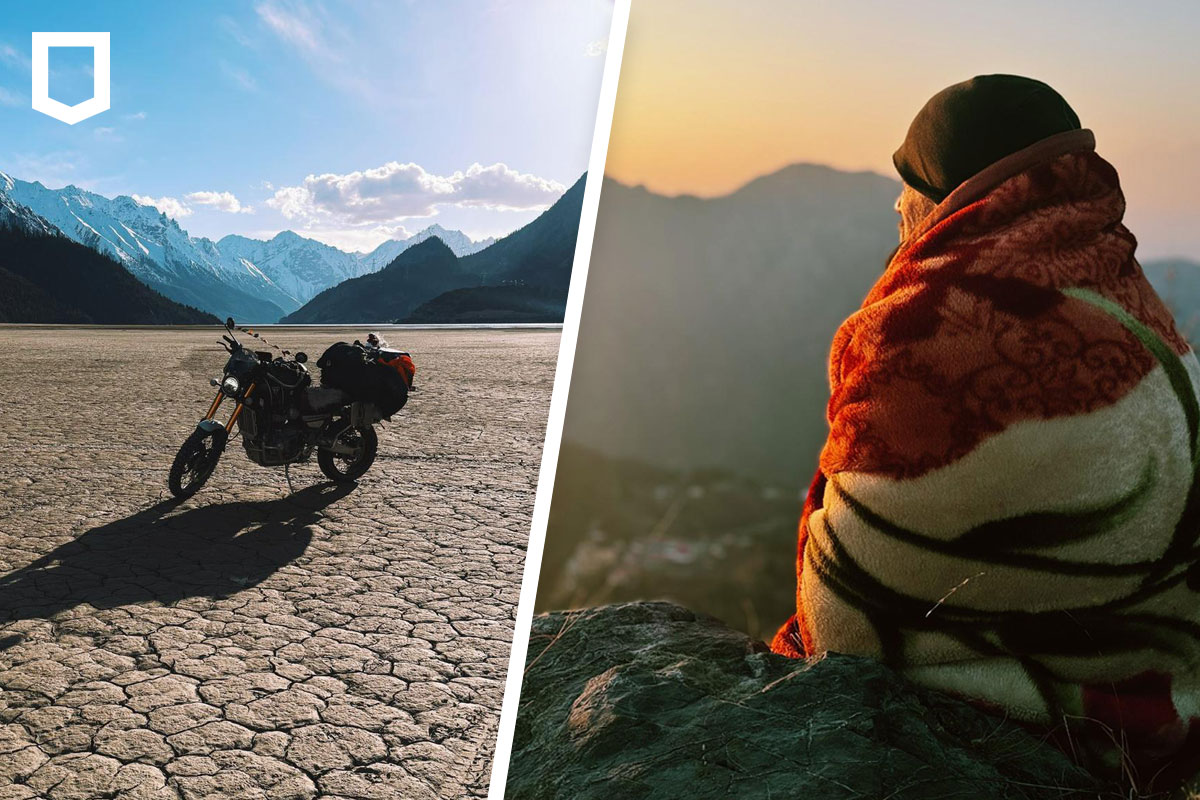
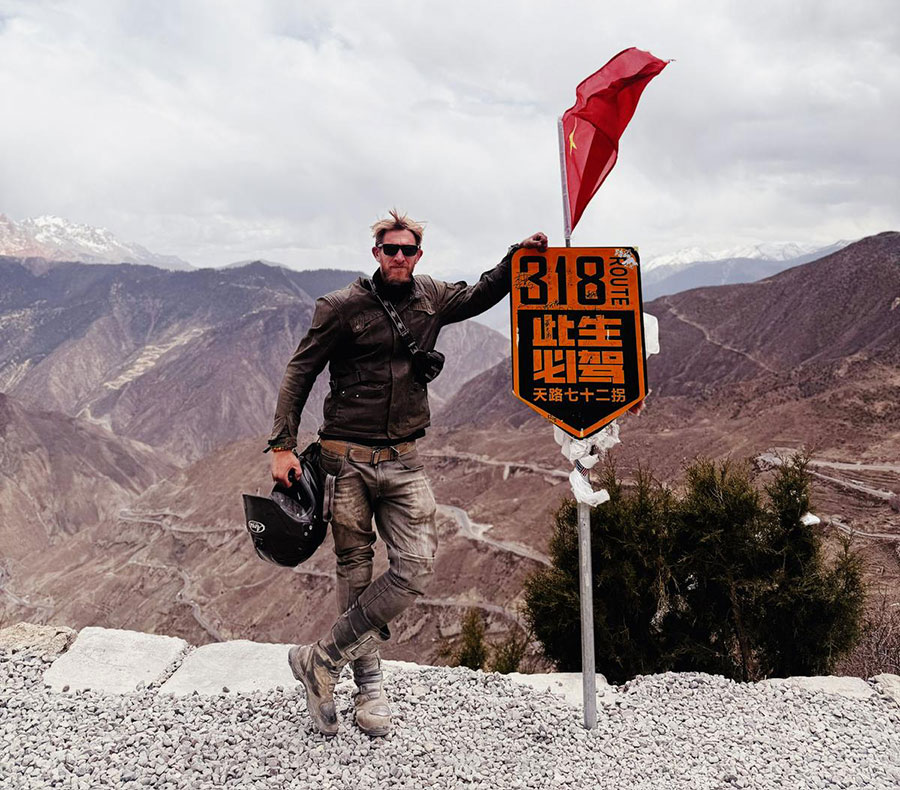
 7) For anyone dreaming of escape but feeling stuck, what would you say to them?
7) For anyone dreaming of escape but feeling stuck, what would you say to them?